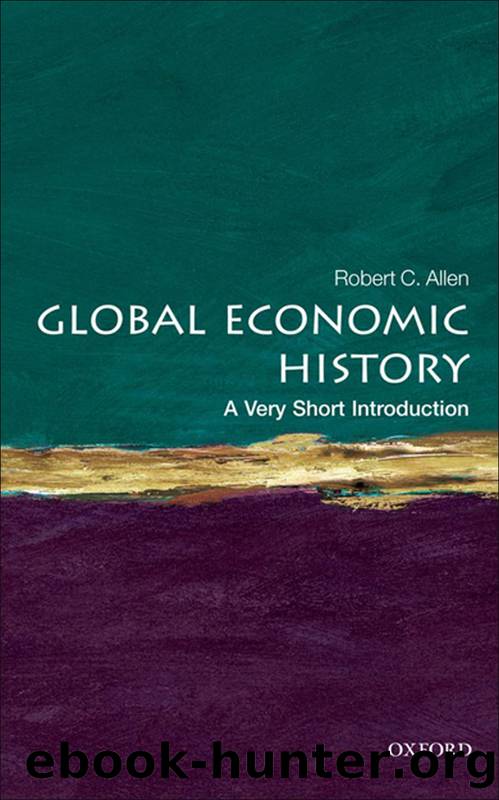Global Economic History by Allen Robert C.;

Author:Allen, Robert C.;
Language: eng
Format: epub
Publisher: Oxford University Press
Published: 2011-08-14T16:00:00+00:00
Chapter 7
Africa
African poverty is not new. Sub-Saharan Africa was the poorest region of the world in 1500, and it remains so – despite the increase in income per head that has occurred. The aim of this chapter is to identify the structures and the contingent events that have kept Africa poor for so long.
The ‘short list’ of candidates is long. Colonial ideology persists in some Western circles, where the poverty of Africans is attributed to their imagined laziness or lack of intelligence. Subtler versions include the view that Africans are bound by tradition or noncommercial values. None of these claims, however, stands up to historical examination.
Institutional explanations for African poverty are also favourites. The slave trade is popular, and, indeed, the poorest countries in Africa today are the ones that exported the most slaves. However, even the countries that resisted the slavers vigorously are still very poor by today’s standards, so something else was going on. Colonialism is another favourite explanation since, in many places, its aim was to transfer wealth from Africans to Europeans. While some development occurred under colonial rule, European administration did not kick-start modern economic growth. Dependency theorists say the reason was too much globalization, for they maintain that Africa’s concentration on exporting primary products has worked to the continent’s disadvantage in the long run. Finally, many recent commentators have emphasized the corruption, interventionism, and authoritarianism of African governments. If failed states were only replaced by Western-run administrations, the economies would take off – but only, of course, if the foreigners got it right the second time around.
To understand why Africa is poor today, we must understand why it was poor in 1500. The answer turns on geography, demography, and the origin of agriculture. The social and economic structure of 1500 then determined how the continent responded to globalization and imperialism, and those responses have kept it poor since.
Download
This site does not store any files on its server. We only index and link to content provided by other sites. Please contact the content providers to delete copyright contents if any and email us, we'll remove relevant links or contents immediately.
International Integration of the Brazilian Economy by Elias C. Grivoyannis(57325)
The Radium Girls by Kate Moore(10907)
Turbulence by E. J. Noyes(7040)
Nudge - Improving Decisions about Health, Wealth, and Happiness by Thaler Sunstein(6633)
The Black Swan by Nassim Nicholas Taleb(6192)
Pioneering Portfolio Management by David F. Swensen(5606)
Rich Dad Poor Dad by Robert T. Kiyosaki(5150)
Zero to One by Peter Thiel(4824)
Man-made Catastrophes and Risk Information Concealment by Dmitry Chernov & Didier Sornette(4738)
Secrecy World by Jake Bernstein(3783)
Millionaire: The Philanderer, Gambler, and Duelist Who Invented Modern Finance by Janet Gleeson(3569)
Skin in the Game by Nassim Nicholas Taleb(3462)
The Age of Surveillance Capitalism by Shoshana Zuboff(3423)
The Money Culture by Michael Lewis(3284)
Skin in the Game: Hidden Asymmetries in Daily Life by Nassim Nicholas Taleb(3264)
Bullshit Jobs by David Graeber(3180)
The Dhandho Investor by Mohnish Pabrai(3169)
The Wisdom of Finance by Mihir Desai(3079)
Blockchain Basics by Daniel Drescher(2891)
